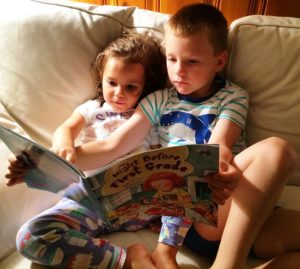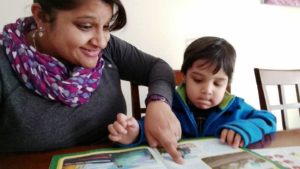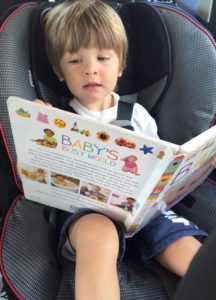Make Sure the Summer Slides Are Only the Fun Kind!
June 18, 2018 | Summer Reading Activities
Many children will end their school year bringing home a list of suggestions to avoid “The Summer Slide,” the term used to describe the loss of knowledge learned during the previous school year. Some research suggests children may lose up to a third of the year’s learning during the summer months. That’s no fun for anyone.
I am the early literacy consultant for Raising Readers, a group who distributes children’s books through well-child visits from birth to age 5. While this age group isn’t usually the focus of discussions about Summer Slide, there are things you can do with your littlest literacy learners during the more relaxed days of summer that will benefit school-age children as well.
“I’m the Big Brother!”
Time with siblings can turn into a great opportunity for big kids to read to little kids. Big kids like to revisit their old favorites and little ones are patient with struggling readers just for the chance to be in their presence. Little ones seemingly endless thirst for the same book again and again (and again!) is actually excellent practice for developing readers’ fluency-building.
Tell Me about It
Summer is a great time to explore questions children have about things they’re learning. From “why” questions to “what kind of bug is that?” children are curious about the world around them. Work with them to find new ways to answer their questions.
In addition to being a great place to beat the summer heat, the library is a wonderful resource for discovering children’s books on any topic (such as the excellent Eye Wonder series for young children and the Eye Witness series for older children), magazines for a wide range of ages (try Zoobooks for school age children, Zootles for preschoolers, or Zoobies for toddlers) and interests (try Dig for your dinosaur fan or Ranger Rick for your nature buff).
Building world knowledge through these investigations will support your child’s literacy abilities now and when they are back in school.
Raising the Bar through Read Aloud
When adults read aloud to their children, they model fluent reading, ask questions to help them think about the story and connect to it, and read at a level above what the child can read by  themselves. This exposes children to a larger vocabulary, more complex sentences, and higher-level ideas. Even in the lazy days of summer, even when you know your child can read to herself, make the time to keep reading to your children. Few things we do with our children have greater benefit than reading aloud. That’s not to mention how rewarding it can be to spread out a blanket under a tree and enjoy a good book together.
themselves. This exposes children to a larger vocabulary, more complex sentences, and higher-level ideas. Even in the lazy days of summer, even when you know your child can read to herself, make the time to keep reading to your children. Few things we do with our children have greater benefit than reading aloud. That’s not to mention how rewarding it can be to spread out a blanket under a tree and enjoy a good book together.
Take Advantage of Summer Travel
Whether it’s a day trip to the beach or lake, or a longer trip to a different state or country, summer travel offers opportunities to research new places, old stories, and new ideas. Each location has special vocabulary to discover – and it can be found by visiting the grocery store, history museum or other local family spots. How about picking up some fiddleheads from a road stand, ploye mix to make traditional Acadian buckwheat pancakes from the supermarket or taste testing poutine at a diner?
family spots. How about picking up some fiddleheads from a road stand, ploye mix to make traditional Acadian buckwheat pancakes from the supermarket or taste testing poutine at a diner?
Learning and talking about new words, tastes, smells and experiences can be an excellent way to boost children’s literacy learning at any age. Use the internet to learn about places you’ll visit and have your child create a “bucket list” of things to see, things they’d like to learn about, and the best ice cream stands (or any other highlight) that they want to be sure to find.
In our family, we always look for The World’s Largest Whatever when we travel. We’ve seen the world’s largest fly rod, buffalo, muskie, Holstein, Ukrainian egg, among other treasures. All were found by the children in advance of our trips through internet searches and AAA Tour Books.
Speaking of AAA
Children love maps. Map reading can be as complicated as tracking a long road trip or as simple as following a hiking trail. Map reading skills can be valuable practice for when children need to read to understand meaning, to find words that are often used or to explore a new type (genre) of story or text.
After you’ve had some practice following a map together, invite your children to make treasure maps for each other to find missing surprises. Also invite them to give their clues in writing so they have a chance to use their language skills. Making maps for your children or giving them clues to a treasure hunt can be great fun for everyone.
Building Vocabulary through Games
Rainy days might have you playing board or video games. Sunny days might lure you outside for sports or other game playing. All games have their own vocabulary. There is a large and growing body of research on the value of having larger vocabularies when it comes to reading comprehension and writing skills. Turn vocabulary building into child’s play by making up games that encourage kids to use language.
Try Category Hopscotch
Category Hopscotch is just a regular game of hopscotch using words like sticky, green, dinosaur, food, or transportation, in the boxes instead of numbers. When hopping, the child names something that goes with the category they land on; for instance, sticky might result in candy, syrup, or Jimmy’s hands.
Play I Spy
Use describing words, and go beyond just color words. For example, “I spy something shiny.” The child would need to know what shiny is and find examples of shiny things to guess. Older kids can design the game for younger children. The game Twenty Questions can also lead to great language games.
Since these are only a few of the many fun, simple ways to enjoy reading, writing, drawing, and language games, we invite you to come visit Raising Readers’ social media pages to tell us how you keep literacy alive this summer! By filling your summer days with lively learning experiences, I know that the only slide your family will experience is of the Slip and Slide variety!
________________________________________________________________________________
Making Sure the Summer Slides are only the Fun Kind was previously published in the 2016 May/June edition of Parent & Family Magazine and on Raising Readers’ blog in June 2017.
Blog post author Dr. Susan Bennett-Armistead is an Associate Professor of Literacy Education at the University of Maine. Drawing on 20 years as a preschool teacher, parent educator, program administrator as well as a PHD with an emphasis in early literacy, she speaks nationally to parent groups and educators on the role that families can play in their children’s literacy learning. She has been the early literacy advisor for Raising Readers for six years. She is also the mother of a lot of kids!
